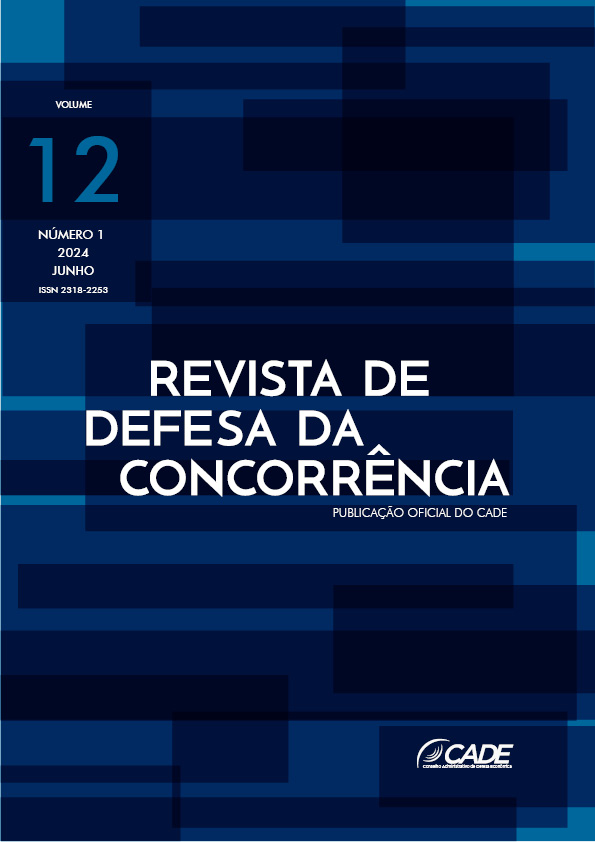Theoretical and empirical analysis on the use of Chicago School and Harvard School premises in decisions of the Administrative Council for Economic Defense between 2017 and 2018
Main Article Content
Abstract
Objective: This paper aims to present the main characteristics of the Chicago School and the Harvard School (Structuralist) regarding the economic doctrine followed by these approaches and the scope of intervention proposed by each of them. This is followed by an analysis of the decisions of Cade’s Tribunal, in which the premises of each approach were used as reasons for the votes of Cade’s commissioners.
Method: Based on the deductive method and on a case law analysis, it is intended to collect examples on how Cade’s Tribunal applies the ideas of the Chicago School and the Harvard School in its decisions. Through a qualitative empirical analysis of these decisions, the paper contributes to the understanding of the approaches adopted by the Chicago and Harvard Schools in the context of competition law and highlights the practical application of these theories by Cade's Tribunal in the context of Merger Review.
Conclusions: The study reveals that Cade's Tribunal legitimized the clearance of a transaction between two of Brazil's leading telecom companies based on efficiencies generated by the transaction and the promotion of consumer welfare, as endorsed by the antitrust approach of the Chicago School. In another case, it was found that Cade's Tribunal, based on the Structure-Conduct-Performance model and on the pursuit of an effective competition in the markets, as stimulated by the Harvard School, blocked a transaction that would create a monopoly between the two main companies in the private education segment. Thus, it is evident that CADE incorporates concepts from these schools in its decisions.
Downloads
Article Details

This work is licensed under a Creative Commons Attribution 4.0 International License.
Os direitos autorais dos artigos publicados são do(s) autor(es), com direitos da Revista de Defesa da Concorrência (RDC) sobre a primeira publicação, impressa e/ou digital.
O(s) autor(es) somente poderá(ão) utilizar os mesmos resultados em outras publicações indicando claramente a Revista de Defesa da Concorrência como o meio da publicação original. Se não houver tal indicação, considerar-se-á situação de autoplágio.
A reprodução, total ou parcial, dos artigos aqui publicados fica sujeita à expressa menção da procedência de sua publicação neste periódico, citando-se o volume e o número dessa publicação, além do link DOI para referência cruzada. Para efeitos legais, deve ser consignada a fonte de publicação original.
Por se tratar de periódico de acesso aberto, permite-se o uso gratuito dos artigos em aplicações educacionais e científicas desde que citada a fonte, conforme a licença Creative Commons Attribution 4.0 International (CC BY 4.0).
References
ATKINSON, Robert D.; AUDRETSCH, David B. Economic Doctrines and Approaches to Antitrust. Washington: The Information Technology and Innovation Foundation, 2011. Disponível em: http://www.itif.org/files/2011-antitrust.pdf. Acesso em: 2 jun. 2023.
BAGNOLI, Vicente. Direito Econômico e Concorrencial. 8. ed. São Paulo: Thomson Reuters Brasil, 2020.
BERTRAN, Maria Paula. Escola de Chicago e Nova Economia Institucional: as principais linhas da análise econômica do direito aplicadas a um caso concreto. 2. ed. Ribeirão Preto: Selo FDRP-USP, 2021.
BORK, Robert H. The Antitrust Paradox: a policy at war with itself. New York: Basic Books, Inc., Publishers, 1978.
BRASIL. Conselho Administrativo de Defesa Econômica. Ato de Concentração 08700.002276/2018-84. Requerentes: Tim Celular S.A e Oi Móvel S.A. Relator: Conselheiro João Paulo de Resende, 7 de novembro de 2018. Disponível em: https://tinyurl.com/29p7j8lv. Acesso em: 30 jul. 2023.
BRASIL. Conselho Administrativo de Defesa Econômica. Ato de Concentração 08700.006185/2016-56. Requerentes: Kroton Educacional S.A. e Estácio Participações S.A. Relatora: Conselheira Cristiane Alkmin Junqueira Schmidt. Voto-Vencedor: Conselheiro Gilvandro Vasconcelos Coelho de Araújo, 28 de junho de 2017. Disponível em: https://tinyurl.com/25j9bege. Acesso em: 30 jul. 2023.
BRASIL. Conselho Administrativo de Defesa Econômica. Edital nº 623, de 27 de outubro de 2022. Edital de realização do 42º Programa de Intercâmbio do Conselho Administrativo de Defesa Econômica (PinCade). Brasília, DF: Conselho Administrativo de Defesa Econômica, 2022. Disponível em: https://tinyurl.com/263cuk98. Acesso em: 3 jul. 2023.
BRASIL. Lei nº 12.259, de 30 de novembro de 2011. Estrutura o Sistema Brasileiro de Defesa da Concorrência; [...] e dá outras providências. Brasília, DF: Presidência da República, 2011. Disponível em: https://tinyurl.com/2o94bhj2. Acesso em: 30 jan. 2023.
BRASIL. Ministério da Economia. Secretaria Especial de Produtividade, Emprego e Competitividade. Guia de Advocacia da Concorrência. Brasília, DF: Ministério da Economia, 2020. Disponível em: https://tinyurl.com/2y6qtuee. Acesso em: 1 jul. 2023.
BRUE, Stanley L.; GRANT, Randy R. História do Pensamento Econômico. 2. ed. São Paulo: Cengage Learning, 2016.
EASTERBROOK, Frank H. The limits of antitrust. Texas Law Review, Austin, TX, EUA, v. 63, n. 1, 1984. Disponível em: https://tinyurl.com/29sadpap. Acesso em: 2 jun. 2023.
FORGIONI, Paula Andrea. Os fundamentos do antitruste. 11. ed. São Paulo: Thomson Reuters Brasil, 2020.
GABAN, Eduardo Molan; DOMINGUES, Juliana Oliveira. Direito Antitruste. 4. ed. São Paulo: Saraiva, 2016.
KHAN, Lina M. Amazon’s antitrust paradox. Yale Law Journal, v. 126, p. 710-805, 2016. Disponível em: https://tinyurl.com/yatw2kkl. Acesso em: 2 jun. 2023.
MANKIW, N. Gregory. Introdução à Economia. 4. ed. São Paulo: Cengage Learning, 2019.
MATTIUZZO, Marcela; BECKER, Bruno Bastos. Plataformas Digitais e a Superação do Antitruste Tradicional: mapeamento do debate atual. In: PEREIRA NETO, Caio Mário da Silva (org.). Defesa da concorrência em plataformas digitais. São Paulo: FGV Direito SP, 2020. p. 40-83. Disponível em: https://hdl.handle.net/10438/30031. Acesso em: 30 jan. 2023.
NUSDEO, Fábio. Curso de Economia: introdução ao direito econômico. Prefácio Tercio Sampaio Ferraz Junior. 10. ed. São Paulo: Revista dos Tribunais, 2016.
SÁ, Catharina Araújo; VILANOVA, Polyanna. As Escolas de Direito Antitruste: o que a história revela. WebAdvocacy, [S. l.], 19 maio 2022. Disponível em: https://tinyurl.com/2872lm8k. Acesso em: 17 jul. 2023.
SALOMÃO FILHO, Calixto. Direito Concorrencial. 2. ed. Rio de Janeiro: Forense, 2021.

